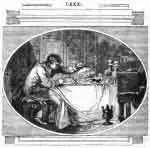An Complainer blamed all ills on Adam. The Lord of the Manor gave him good life so long as he avoided one dish. He didn’t, and could no longer blame Adam.
It’s easy to blame others; hard to take blame.

Northcote
A lazy Fellow that loved idleness much better than work, was always complaining and grumbling at the hardness of his lot, in being obliged to get his daily bread by labour and the sweat of his brow, accusing father Adam as the cause of this heavy curse upon mankind, merely from a weak and pernicious curiosity to taste the forbidden fruit, and that too, at a time when he was surrounded by every gratification which the most inordinate imagination could desire or appetite could enjoy. One day as he was making his usual discontented murmur in the fields, when he ought to have been at work, by accident he was overheard by the Lord of the Manor, who came unawares to the place, and being a man of good understanding and wit, spoke to him mildly, saying, “He should no longer have any cause to curse Adam as his punisher by daily toil, hence forward,” said he, “you shall live wholly at your ease, as every necessary you can desire shall be amply provided for your use, nor shall any labour be required from you.” The Peasant was overjoyed at this munificent offer, and accordingly orders were given that there should be provided for him every day, a great variety of dishes to humour his palate, and for a time he thus passed his life to his heart’s content. But every day amongst the rest of the dishes brought to his table, there was one small covered dish, which he was commanded by his patron not only never to presume to taste, but never even so much as to lift up the cover to see what was under it, on pain of being sent back with shame to his former state of life. He most religiously complied with this injunction for some time; but at last his curiosity became so importunate, that he could resist it no longer, thinking that no possible harm could accrue merely from taking a sly peep at the contents of this mysterious dish, which he could easily do, as nobody attended him at his meals, and therefore he was in no danger of being betrayed by a witness. Thus tempted, he resolved to unriddle the cause of this foolish prohibition, as he thought it, when very gently lifting up the cover, in a moment out leapt a little mouse, which had been purposely placed there, in order to betray him, if he should ever attempt to break his engagement. As the mouse made his immediate escape, he had no possible means of preventing a discovery. The servants soon after entered to clear the table, and on examination of the covered dish by the Lord of the Manor, it was found that he had broke his engagement, and forfeited his right to an idle life. He was accordingly forthwith dismissed to his original state, with this admonition. “Conceited and ungrateful man, hence forward no more curse Adam, but know it is your own act that has doomed you to labour, and as you have brought it upon yourself, never in future impatiently and harshly blame those actions in others, which had you been in their situation, in all probability you would have done yourself.
Application
When we suffer under any kind of inconvenience, we are generally very ingenious in discovering how it was not our own misconduct that brought it upon us, and can easily see cause to attribute it to that of another, when perhaps it has been wholly ourselves we have to blame; and if we could have searched a little deeper, and with a little less partiality, it would have appeared evidently so to our senses. We can clearly enough perceive the misconduct in others, and trace the consequent ill effects of it; but in our own case, every calamity that attends us seems to be fated by our unlucky stars, and as if nothing we could have done would have prevented the evil.
So thought the Grumbler in the Fable, until by the cunning device of his sagacious Lord, it was proved to be his own fault alone from which he suffered. J. N.
